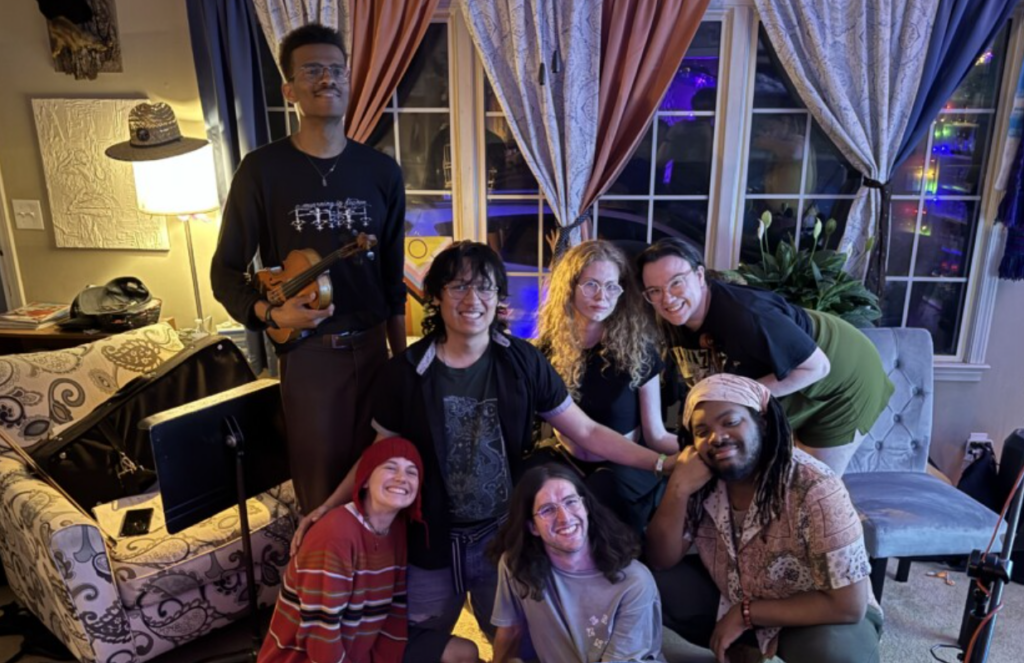Devil May Care: Satanic Temple’s KC legion builds community, supports bodily autonomy
Far from being the demonic doomsday cult that its critics imagine, The Satanic Temple (TST) is a non-theistic religion that provides empowerment and community. It welcomes members from all backgrounds to assert their religious rights and bodily autonomy.
In Missouri, there are four branches—or Legions—of the Temple: Kansas City, Mid-Missouri, Springfield/Ozarks, and St. Louis.
Kansas City Legion’s Vice Commissioner VRap (who operates under a Satanym) has been a member of TST for two years.
“I have been an atheist my entire life,” VRap says. “And I have seen that my religious friends have that sense of community within their religious organizations. And that’s something that you miss as an atheist.”
TST has given VRap the sense of belonging that she was missing, along with an atmosphere of acceptance that was extra comforting for her as a queer woman.
Now she’s helping to organize meetings and get-togethers for other members. TST offers a variety of activities, including movie nights, art gallery trips, museum tours, a monthly book club, and an arts and crafts club.
For the past three years, Legion members have also marched in KC Pride.
“When people go out there to protest pride—like the Westboro Baptist Church—they can yell ‘go to hell’ to us all day long,” Minister Pandora Stolas says, laughing. “We can take it.”
Instead of summoning Beelzebub, members of The Satanic Temple Missouri channel their energies into volunteering. Satanists put together care packages for their local houseless communities and organize donation drives for domestic violence shelters, food pantries, and animal shelters across the state.

The Satanic Temple’s rituals are built upon uplifting one another—not upon blood sacrifices. // Courtesy The Satanic Temple Missouri
Members are especially proud of TST’s Sheets for Satan project.
In sexual assault cases, investigators often collect victims’ sheets for evidence, leaving some individuals without any bedding. The Legion donates bed linens to the Kansas City Police Department to alleviate this concern.
Stolas says that TST tackles taboo topics in its volunteer work. “A lot of churches do volunteer work, but where we differ is that we’ll do things like Menstruation with Satan, where we donate menstrual products to women’s shelters, because those are products that are often not thought about,” she says.
On an international level, The Satanic Temple is coordinating donations for Ukrainian refugees to ensure their safe transport and accommodation.
Its Sober Faction meetings provide peer support for those suffering from addiction.
TST even offers After School Satan, a science, technology, engineering, and math (STEM) based program.
“There is a traditional Satanic misconception that we, you know, are evil,” VRap says. “And we sit around and we do some sort of black magic or—God forbid—blood sacrifices or something of that nature. And that is wholeheartedly untrue.”

“We do all kinds of rituals,” says Minister Kai Ricinus Darkwood. “We’ve done unbaptisms, which is a way to wash away the fear that sometimes is put on us by religious experiences. It’s a way to start new, start fresh.” // Courtesy The Satanic Temple Missouri
While members of TST do engage in rituals, they’re actually pretty wholesome.
Minister Kai Ricinus Darkwood says outsiders are often confused by the terminology because TST is nontheistic.
“Basically, there’s a psychology to doing these kinds of rituals,” Darkwood says. “A lot of people here come from religious backgrounds. It’s kind of a cathartic thing for them. But, in general, doing these rituals kind of helps you connect to an idea or purpose. A lot of our rituals are building up self-confidence and getting rid of trauma and pain that we’ve endured in our lives.”
VRap explains that TST uses the figure of Satan in a literal form to represent an adversary.
“We do not literally believe in Satan,” she clarifies. “If you’re curious, go to The Satanic Temple’s website, look at our tenants, look at what we’ve done. The term Satanic—when you’re labeled that, usually it’s done to entice fear and hatred. And that’s what we’re trying to take back. It’s one of those terms that is often lobbed to shut down a conversation. That is not what we’re about. We’re an atheistic community just trying to fight for plurality and fairness. And to give atheists a voice in the same legal regard as Christians have had their voices heard.”
In the wake of the Supreme Court’s decision to overturn Roe v. Wade, TST’s mission has become even more timely. In 2018, TST sued the state of Missouri on behalf of plaintiff Judy Doe.
Missouri law previously stated that anyone seeking an abortion must be given the opportunity to see an ultrasound of the fetus and hear the heartbeat 72 hours before the abortion is performed. Additionally, the health care provider was required to give out a booklet that said human life begins at conception.

The Satanic Temple’s adopted street bears the name of the local Legion. // Courtesy The Satanic Temple Missouri
The group asserts on its website that “that the mandated imposition of religious opinions upon Satanists seeking to terminate a pregnancy violates TST’s deeply-held beliefs of bodily autonomy and scientifically-reasoned personal choice.”
Missouri’s trigger law has outlawed abortion except in cases of medical emergency. Even in the case of rape or incest, abortion is illegal—an infringement on basic rights that TST vehemently opposes.
TST attracts a lot of attention for its name, aesthetic, and activism, but Stolas says that members are conscious of the organization’s image.
“You know, you don’t hear about a lot of our volunteer work because it’s not publicized on purpose,” she says. “We will go out and shovel snow for elderly or disabled people. But we’ll just say, ‘Hey, we’re a church group,’ because we’re not there to give Meemaw a heart attack. We’re there to help people.”
Yes, we live in a hellscape. But TST continues to oppose anti-abortion legislation, push for the separation of church and state, and organize community volunteering. And that’s the opposite of the traditional devil-may-care attitude. The devil does, it turns out, care.





